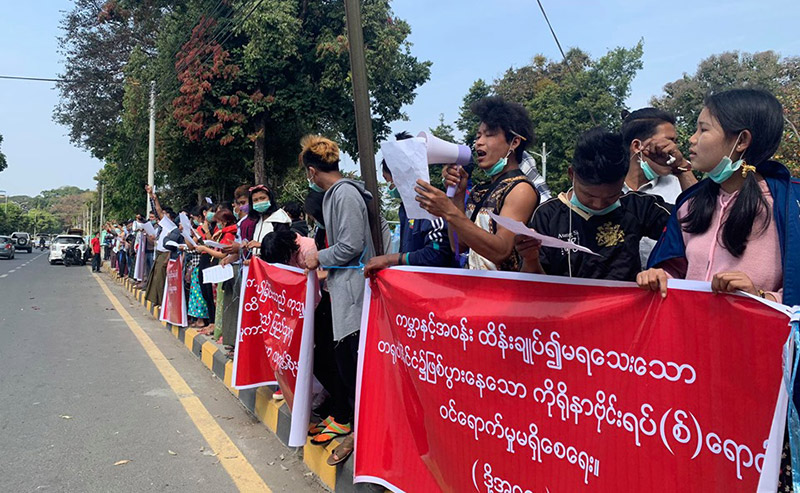Hundreds of residents near the border with China took to the streets yesterday to demand tougher health measures as doubts persist about Myanmar’s immunity to COVID-19.
Concerns about the flow of trade and people across the border in the border town of Waingmaw saw about 300 protesters call for temporary restrictions and accuse local authorities of neglecting public health.
“Even if you have a common sickness, there are no beds for you at the government hospital. You’d have to bring your own bed,” protest organizer Daw Too said, citing the nation’s inadequate health infrastructure. “People have to sleep on wooden benches at the Waingmaw government hospital now. If the outbreak occurs, where would we go? Where would we get medical treatment? Everyone will die.”
The government has maintained that it won’t ban travel from China. Myanmar shares a porous border of over 2,000 kilometers with its northeastern neighbor, where the virus has stricken nearly 80,000 people and killed more than 2,500.
“If one of them carries a disease, it could spread to the entire (Kachin) state,” Daw Too said.
Since the outbreak began, Naypyidaw has maintained there are no infections in the country – an unsurprising claim when no domestic hospital was capable of testing for it.
Just four days ago, the government announced that it would begin testing suspected cases at a government facility in Yangon with equipment donated from the WHO, Thailand and Japan.
Deep economic ties mean cross traffic is difficult to reduce or control. As China seeks to reopen for business, thousands of Burmese workers headed back to Chinese factories after roads were reopened there, according to Eleven Media Group.
Four suspected patients are in quarantine, but the latest update from health officials is that none has sign of infection.
The Health and Sports Ministry announced yesterday that a 34-year-old Korean woman who visited Yangon from Feb. 13-17 had tested positive for the virus. Seven people who came into contact with the woman, and their family members, were being closely monitored.
Responding to an outbreak could overwhelm Myanmar’s hospitals, which are already overcrowded due to underfunding. Only 4.5% of last year’s budget was reserved for healthcare while defense received three times as much. Myanmar is behind only Laos in healthcare spending per person in ASEAN.
While there is good cause for speculation about whether the virus has already taken root in Myanmar, the government is following its gag-the-messenger approach by proposing new controls to contain the authority-corroding virus that is information.
The health and sports ministry has proposed amending a 1995 disease law to award any healthcare workers who talk to the press or the public about an outbreak with six months of jail and a fine of MMK100,000 (US$70).
Members of the public are encouraged to report any suspected cases to health authorities via hotline 067-342-0802.
Related:
On guard, Myanmar asks for travel sector vigilance as Wuhan infections accelerate across region




